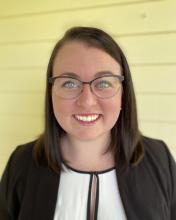2022 Caplan Prizes Honor Outstanding Student Papers
The University of Chicago Law School awarded two prizes for outstanding academic papers this month.
Angel Lockhart, ’22, earned the Herbert L. Caplan Prize for Creative Legal Thinking, which is given for the best original student paper discussing an issue of contemporary interest and concern and advancing creative legal solutions. The award honors “original developed thought about how to reform current law and practices to help address and solve existing community needs and better serve the public interest.”
Erin Simmonds, ’23, earned the Herbert L. Caplan Prize for Reform in Public & Constitutional Law, which is awarded to the outstanding student paper that proposes a creative and feasible solution to a critical issue in the public law. The award honors “original developed thought about how to reform current law and practices to help address and solve existing community needs and better serve the public interest.”
Herbert L. Caplan, ’57, established the Creative Legal Thinking award in 2015 and the Reform in Public & Constitutional Law award in 2017. Caplan, who also is a 1952 graduate of the College, dedicated his entire career to public service. He retired in 1998 after spending the bulk of his career as First Assistant Illinois Attorney General and in the City of Chicago's Law Department.
A three-person faculty committee led by Geoffrey R. Stone, the Edward H. Levi Distinguished Service Professor of Law, selected this year’s Caplan Prize winners.
Lockhart’s paper, “First Day Out: Prisoner Reentry from the Family’s Perspective,” examined the challenges faced by families after a relative is released from prison. In addition to examining trends and the small amount of existing research, the paper included journalistic accounts of nine individuals who were preparing for or had experienced the return of a family member from prison.
Lockhart said she chose the topic because her mother supported seven incarcerated family members during their release.
“She was a single mother of four and didn't have much to offer but a second chance at life,” Lockhart said. “We learned a lot about prison, supervised release, and the collateral consequences of criminal convictions. We saw the difficulties of the prison reentry process firsthand. We also saw nonprofit organizations helping our family members find counselors and employment services.”
But, Lockhart added, no one ever asked her mother about her well-being.
“We learned that the traditional role of families in the prisoner reentry process is to give, not to take,” she said. “So, I wanted to amplify the voices that are rarely heard and propose solutions that prepare families for the lengthy prisoner reentry process.”
Lockhart said she was “thrilled and pleasantly surprised to know I won the Caplan award.”
“I immediately sent a screenshot of the announcement to my mother and the individuals who participated in the survey,” she said. “We said hallelujah, thank you Jesus, and might've shed a few tears.”
Simmonds’ paper, “Abortion and the Establishment Clause: A New Constitutional Method and Case Study,” examined whether religious freedom arguments could be used in opposing antiabortion laws in which were religiously motivated but justified on secular grounds.
“I wrote this paper because it was a great opportunity to bring together my graduate studies in American religion, the ideas and methods I’ve learned in Law School, and an important and timely issue: reproductive justice,” said Simmonds, who earned an MA from UChicago’s Divinity School in 2017 and is currently pursuing a PhD from the Divinity School. “I’m thrilled to have won the Caplan Prize and to know that there are ideas in the paper that I can keep developing.”
Each recipient will receive $15,000.

